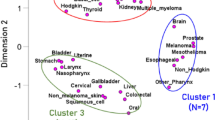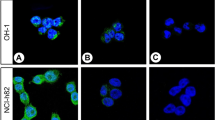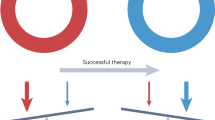Abstract
TUMOUR cell populations are heterogeneous with respect to various biological properties1–3. Immunological properties that influence tumour–host relationships and metastatic properties of tumours may also differ between subpopulations of tumour cells4,5. In addition, conditions of growth may favour the emergence of subpopulations, and the immunogenic modification of susceptible subpopulations. We have reported that highly immunogenic tumour cells can be isolated from the parental tumour by concanavalin A (con A)–affinity chromatography6,7, and the relative proportion of different subpopulations varied with different conditions of growth. We now report that the tumorigenicity of murine adenocarcinoma varies as a function of the tumour sub-populations present, as defined by their expression of cell-surface carbohydrates.
This is a preview of subscription content, access via your institution
Access options
Subscribe to this journal
Receive 51 print issues and online access
$199.00 per year
only $3.90 per issue
Buy this article
- Purchase on Springer Link
- Instant access to full article PDF
Prices may be subject to local taxes which are calculated during checkout
Similar content being viewed by others
References
Hutchinson, D. J., and Schmid, F. A., in Drug Resistance and Selectivity: Biochemical and Cellular Basis (edit. by Mihich, E.), 73–126 (Academic, New York, 1973).
Sharp, J. D., Capecchi, N. E., and Capecchi, M. R., Proc. natn. Acad. Sci. U.S.A., 70, 3145–3149 (1973).
Hosokawa, M., Orsini, F., and Mihich, E., Cancer Res., 35, 2657–2662 (1975).
Kim, U., Baumler, A., Carruthers, C., and Bielat, K., Proc. natn. Acad. Sci. U.S.A., 72, 1012–1016 (1975).
Fidler, I. J., Nature, 242, 148–149 (1973).
Killion, J. M., and Kollmorgen, G. M., J. Cell Biol., 67, 210a (1975).
Killion, J. J., and Kollmorgen, G. M., Nature, 259, 674–676 (1976).
Parks, R. C., and Jacobs, B. B., J. natn. Cancer Inst., 54, 1079–1083 (1975).
Parks, R. C., J. natn. Cancer Inst., 54, 1473–1474 (1975).
Cikes, M., Friberg, S. Jr, Klein, G., J. natn. Cancer Inst., 50, 347–362 (1973).
Cikes, M., J. natn. Cancer Inst., 54, 903–906 (1975).
Sanford, B. H., Transplantation, 5, 1273–1279 (1967).
Sanford, B. H., et al., J. Immun., 110, 1233–1237 (1973).
Codington, J. F., Sanford, B. H., and Jeanloz, R. W., J. natn. Cancer Inst., 51, 585–591 (1973).
Miller, D. K., Cooper, A. G., Brown, M. C., and Jeanloz, R. W., J. natn. Cancer Inst., 55, 1249–1252 (1975).
Sanford, K. K., et al., J. natn. Cancer Inst., 23, 1061–1077 (1959).
Author information
Authors and Affiliations
Rights and permissions
About this article
Cite this article
KILLION, J., WALLENBROCK, M., ROGERS, J. et al. Tumorigenicity and the expression of cell-surface carbohydrates. Nature 261, 54–56 (1976). https://doi.org/10.1038/261054a0
Received:
Accepted:
Issue Date:
DOI: https://doi.org/10.1038/261054a0
This article is cited by
-
Intratumor immunologic heterogeneity
Cancer and Metastasis Reviews (1982)
-
Neue Ergebnisse zur biologischen und medizinischen Bedeutung von Glycoproteinen
Klinische Wochenschrift (1979)
-
Immunotherapy with tumor cell subpopulations
Cancer Immunology Immunotherapy (1978)
-
Immunotherapy with tumor cell subpopulations
Cancer Immunology Immunotherapy (1978)
Comments
By submitting a comment you agree to abide by our Terms and Community Guidelines. If you find something abusive or that does not comply with our terms or guidelines please flag it as inappropriate.



